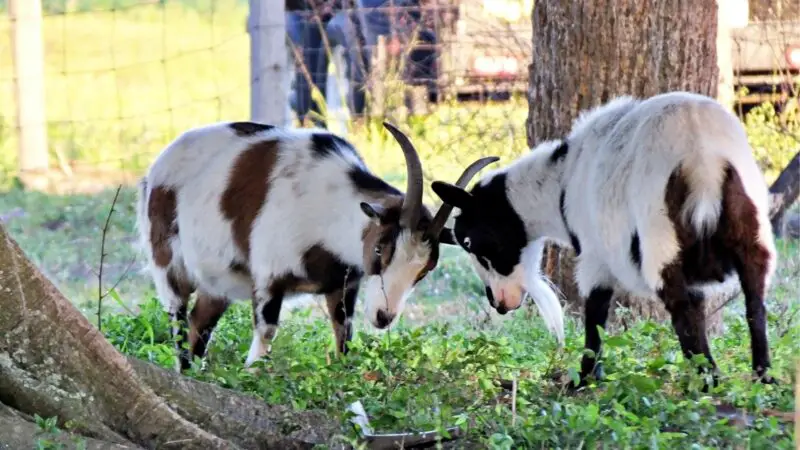Fainting goats has always been a curious phenomenon. It has become one of the viral animal videos you can find on the Internet today, so it’s quite a source of entertainment as well.
However, is it painful for the animal? Is it a serious condition that requires immediate treatment? Are they the same as the myotonic goats? Read on to know the answers.
Myotonic goats faint because their muscles stiffen as a reaction to being shocked. Because they can no longer move their muscles, these goats fall over, making it look like they have fainted. Fortunately, this condition is not serious and is not painful for these goats.
If you’re curious to learn more about these goats, then you came to the right place. Read on to learn about their condition, their characteristics, and whether they make great pets or not. You’ll also learn about how to take care of them if you ever decide to get one for your farm.
Tennessee Fainting Goat History

There is some uncertainty as to the origin of the Tennessee fainting goat. The earliest record of fainting goats dates back to the 1800s and was reported to have been brought into Tennessee by one John Tinsley from Nova Scotia. However, how and when they started fainting, is still unclear.
While it is known that myotonia congenita is the condition that causes the muscles to stiffen, the exact origin of how it came to be, and how the Tennessee fainting goats got it, is unknown. Some believe that it came from another goat breed, while others believe it resulted from a genetic mutation.
What Is a Tennessee Fainting Goat?

The Tennessee fainting goat, otherwise known as the myotonic goat or the stiff-legged fainting goat, is a goat breed that has a condition called myotonia congenita.
This condition causes the muscles to stiffen whenever the goats are shocked or scared, and that results in their inability to move and falling over. This is why they are nicknamed fainting goats.
According to the International Fainting Goat Association, muscle stiffness does not take long and only occurs for around five to twenty seconds.
In some instances, these muscles also stiffen when they feel excited. Once the muscles begin to relax, the goats can then stand up and walk away like usual.
The Tennessee fainting goat is primarily bred for its breed. However, since it can give birth every six months, they also produce a good amount of milk.
What Do Tennessee Fainting Goats Look Like?
The Tennessee fainting goat is a small goat breed that’s characterized by its wide and bulky bodies supported by four narrow legs. They have a V-shaped yet slightly dished face, small ears, and a pair of long horns that grow outwards from the top of their heads. Most Tennessee Fainting goats have short hair that’s either white or black.
How Long Does a Tennessee Fainting Goat Live?
On average, a Tennessee Fainting goat can live between 12 to 15 years. But if given extraordinary care, they can live for up to 18 years. Fortunately, their fainting condition does not affect their overall health and longevity.
What Do Tennessee Fainting Goats Eat?
Like other goats, the Tennessee fainting goats love to graze. As herbivores, their diet mostly consists of grass, shrubs, and hay. Some farmers prefer to feed their goats with clover and alfalfa to ensure they have a balanced diet.
How Big Do Tennessee Fainting Goats Grow?
In terms of height, Tennessee fainting goats are notably shorter than the standard goat breed. On average, expect them to grow between 17 to 25 inches tall.
Are Tennessee Fainting Goats a Heavy Breed?
Tennessee fainting goat is not considered a heavy breed. Despite their short stature, the Tennessee fainting goats are quite muscular, which makes them heavier than other small goat breeds. But even then, they are still not considered a heavy breed.
To give you a better idea, the standard weight of Tennessee fainting goats is around 60 to 80 pounds. Whereas, heavy goat breeds such as the boer goat can weigh between 200 to 300 pounds.
What Is Tennessee Fainting Goat Known For?
Since the Tennessee fainting goats have such muscular bodies, they produce a good amount of meat. As such, they are primarily bred for meat production. However, some farmers also breed them for their milk, especially since they can give birth every six months.
The Tennessee Fainting Goat is also known for its sweet and gentle temperament. Because of this, raising them as pets is also quite common.
Where Do Tennessee Fainting goats Originate?
The earliest records of the Tennessee fainting goats show that this goat breed originally came from Canada. Specifically, they were brought to Tennessee from the Canadian province of Nova Scotia in the 1800s.
What Are the Distinct Characteristics of a Tennessee Fainting goat?
The Tennessee fainting goat’s most dominant characteristic is how it faints whenever it is shocked, scared, or excited. This is due to a genetic condition that causes their muscles to stiffen – a condition that’s common within this goat breed.
They are likewise known for having wide and bulky bodies as opposed to other goats of the same size. As a result, their carcass produces a good amount of meat.
Tennessee Fainting Goat Temperament
The Tennessee Fainting Goat is known for its sweet and gentle temperament. They are quite social, making them great around kids and other animals. They are also smart, making them easy to train or interact with.
Are Myotonic and Tennessee Fainting Goats Same?

Myotonic and Tennessee fainting goats refer to the same breed of goats. The genetic condition that makes them appear like they fainted after they feel excited or scared is called Myotonia Congenita – which is why they are also called “Myotonic Goats”. Other nicknames bestowed upon this breed include Stiff-Legged Goats, Falling Goats, and Nervous Goats.
Why Do Tennessee Goats Faint?

The Tennessee fainting goats have a condition that causes their muscles to become stiff whenever they are scared, excited, or surprised. This condition is called Myotonia Congenita, which is a genetic condition among this goat breed.
However, they do not actually faint or lose consciousness while they have fallen to the ground. They only lose control of their stiff muscles, which is why they fall down. Fortunately, it only lasts for a few seconds, after which the goats will be able to stand and walk again.
How Much Does a Tennessee Fainting Goat Cost?
A Tennessee fainting goat can be bought for as low as $50 or as high as $600. This largely depends on whether the goat is Pedigreed or Unpedigreed.
A Tennessee fainting goat is Pedigreed if it has been bred through recorded ancestry, and these goats sell for around $300 to $600. In the case of Unpedigreed fainting goats, or those with no recorded ancestry, they often sell for less than $300. Usually, if the goat will be raised as a pet, the price can go from around $50 to $100.
Related: How Much Does a Fainting Goat Cost? | Buyers’ Guide
Is It Harmful for a Fainting Goat to Make Them Faint?
Fortunately, this condition is not painful for the fainting goats. And the fact that their muscles recover from the stiffness within seconds means that it is not of serious concern.
However, the fact that they cannot run away when they feel scared may cause them stress. Also, they may get hurt from the fall if they faint while standing on hard surfaces – or if they fall from raised surfaces.
Are Fainting Goats Profitable?
Fainting goats are profitable. As earlier established, fainting goats have muscular bodies that produce a good amount of meat.
They’re also good milk producers, and that makes them a dual-purpose breed. With that said, you can profit from farming fainting goats.
Additionally, the novelty of their condition makes them sought-after pets. And with one selling at an average of $100 to $300, there’s no denying that this goat breed is profitable.
Are Fainting Goats Good Pets?
Fainting goats make good pets. They are non-aggressive and known for their gentle nature. That makes them safe to be around pets and other children. However, since the Tennessee fainting goat loves to graze for food, it’s best to keep them as outdoor pets instead of indoors.
How High Can a Fainting Goat Jump?
A Tennessee fainting goat can jump at a height of around 1.6 feet. This is quite low compared to the average 4 or 12-foot jumps from other goats. As a result, fainting goats cannot easily escape fenced premises.
Tips in Taking Care of Tennessee Fainting Goats
- Access to food and water. Like all goats, the Tennessee fainting goats need enough space to roam around and graze. Having a big farm will provide your goats with enough food and space to freely play and roam around. But if the grass is not enough, you may opt to supplement it with hay or alfalfa.
The Tennessee fainting goats likewise need access to clean drinking water so they don’t get dehydrated. You can give them water through drinking bowls, but make sure to wash and replenish it with clean water at least twice a day.
- Give them a safe shelter. To ensure that your goats stay healthy throughout the seasons, it’s best to build them an enclosed shelter to keep them safe from harsh summers and freezing winters.
- Take them to the vet regularly. Like all farm animals, your myotonic goats also need regular visits to the veterinarian. Even if your fainting goat is perfectly healthy, you have to take them to the vet to keep them in good health. The vet will also provide them with the necessary vitamins to strengthen their immune system.
- Keep them fenced. While the myotonic goat cannot jump high enough to escape most fences, they are susceptible to being preyed on. It is especially easy to prey on them since they cannot run whenever they feel scared. Thus, it’s best to keep your farm’s fences high enough to keep predators away.
Related: Related: How to Trim Goat Hooves | Easy-to-Follow Steps!
Is It Expensive to Raise Fainting Goats?
It is not expensive to raise fainting goats. Aside from the acquisition costs, as well as owning vast farmland to raise your goats, fainting goats require the same care as any other goat.
They need to have enough food, access to clean water, a shelter where they can keep warm when the weather’s bad, and regular vet visits. With that said, expect to pay around $50 to $100 per month for your fainting goats.
The condition that causes the Tennessee Fainting Goats to faint is unique. Because they faint after being shocked, these goats are often the subject of pranks that lead their muscles to stiffen.
But while it seems adorable and doesn’t cause pain to the goats, the inability to run after being shocked may cause them stress. Thus, it’s best to avoid surprising them intentionally.
List of Sources
Goat Discovery – Breeds – Tennessee Fainting
Molecular Basis for Decreased Muscle Chloride Conductance in the Myotonic Goat
